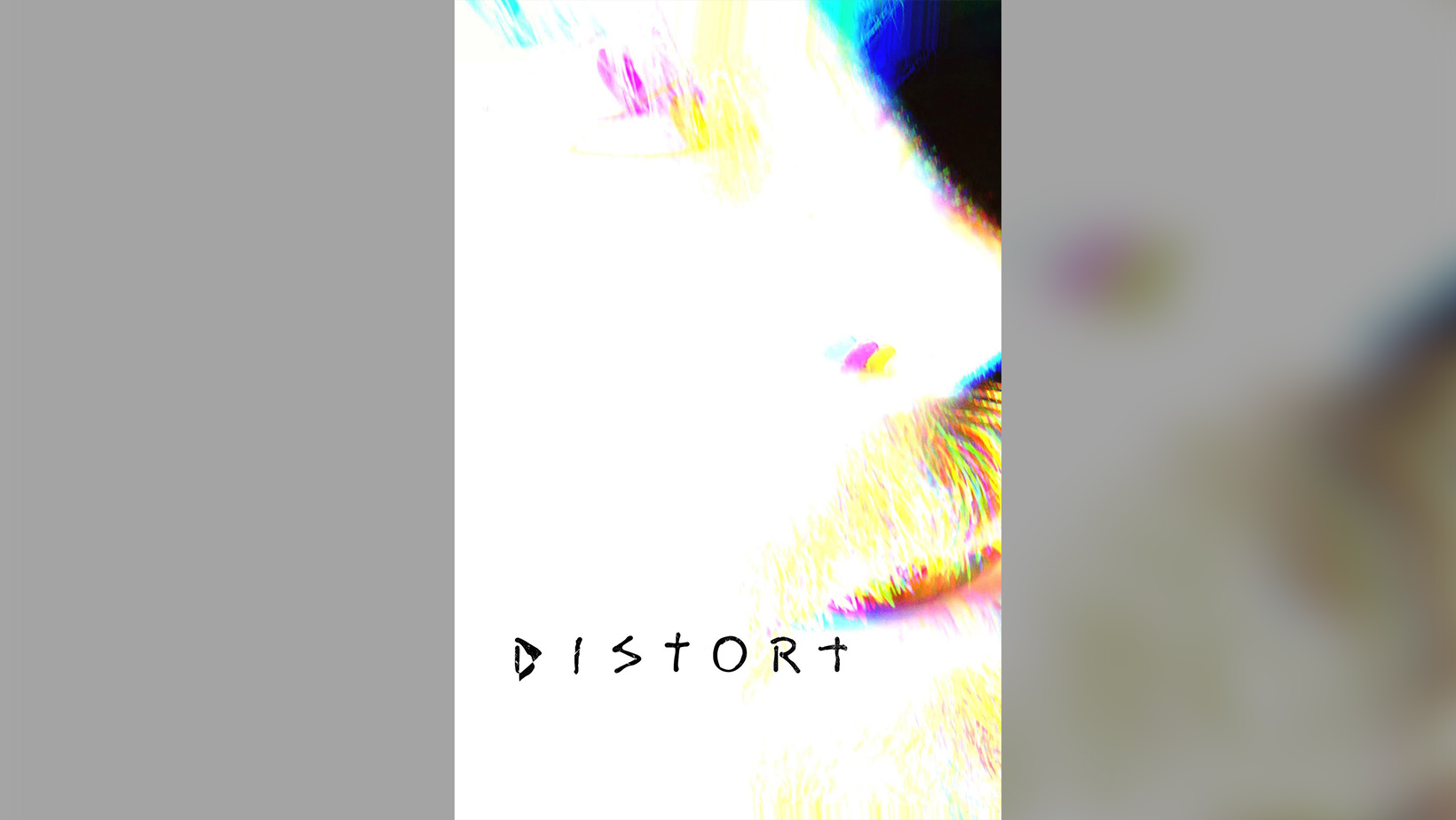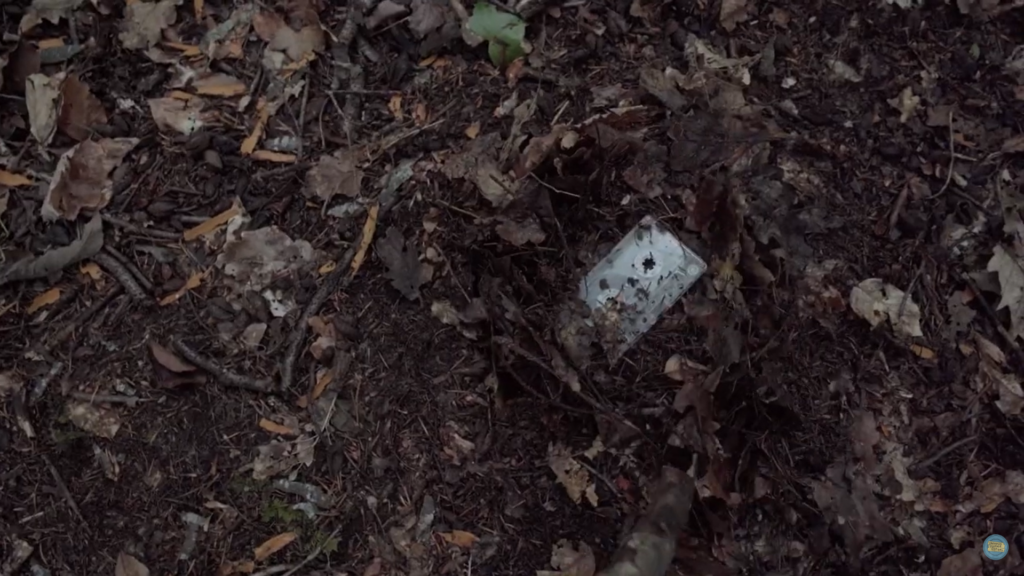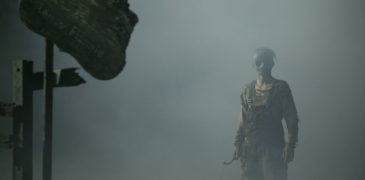
An Irish musician, played by writer, director, and editor Richard Waters, heads into the woods to record a music album. Using the inspiration of nature and a break from the chaos of the real world, the trip soon turns sour when the musician encounters a series of weird instances. Hearing dogs and sensing a constant presence just out of his sight, the lone traveler starts coming across a series of audio cassettes speaking about the urban legends surrounding a murdered man. Desperate to escape, he finds himself bound to the woods, surrounded by a malicious spirit and his dogs.
Viewers will spend most of the run time tuned into Water’s struggling musician, whether it be his introspective ramblings about his life or his attempts to process the bizarre recordings he finds in the woods. Thankfully, the central character has an earnest, down-to-earth charm that allows for that needed connection for a minimalistic found-footage horror film to stay engaging. By extension, the lore woven throughout the film is impactful, as one feels like they are trying to unravel the mystery alongside the character instead of observing a dull and uninteresting protagonist dealing with the unknown—the bane of many found footage films.

The promo material leading up to Distort’s showing at the Unnamed Footage Festival drew a comparison to Justin Benson and Aaron Moorhead’s underrated slow-burn masterpiece Resolution. Often, these claims to hype up a film are hyperbolic at best. Yet, in this case, it is very apt to describe the tone, flow, and use of a layered story to allude to something more sinister beyond the supernatural happenings. Yes, we have an old man ghost in a forest with dogs, but this is just the surface tension. The tapes found throughout the woods tell a much more devious and haunting story that viewers must try to interpret themselves; on a side note, stick around for the credits for one particular piece of the puzzle being revealed.
While deep wood horror is often defined through dreariness and turning a wide-open space into a claustrophobic nightmare, Richard Waters offers a more balanced visual experience. The juxtaposition of beautiful landscapes accompanied by guitar to a blackened forest navigated in a panic presents both the beauty and inherited chaos of the woods in an exhilarating fashion. Moreover, there is a creative use of black and white filters in conjunction with the found audio recordings that cleverly hint at an otherworldly connection between the woman and the musician.

Visually and conceptually, Distort lays a solid foundation. However, as a found footage horror film, it will fall flat for those looking for more shock and sensational moments. There are one or two decent jump scares, but even these are muted in favor of character development and worldbuilding. As a found footage faithful, these deviations are welcome and help showcase the depth of the types of stories the genre can explore. Still, a bit of extra shock would have helped the final moments, and thus the entire production, to be more memorable.
Distort shows what the found footage genre is capable of and how creators can create stories that extend far outside the inherent restrictions of the found footage genre. Yet, the production needed to push a bit more to become a must-watch, timeless entry in the genre; the immediate impact of the film is felt but will likely fade from memory with time due to lacking a strong visual hook. Richard Waters is no stranger to found footage, having previously delivered a gem in 2018’s In a Stranger’s House. Distort provides a more realized and engaging experience than his previous works, showing that Waters is one of the most exciting emerging filmmakers working in the found footage medium.

Distort is Streaming As Part of the Unnamed Footage Festival. The film will screen on Saturday, 29th at 12:05.

More Film Festival Coverage
Behind the Mask: The Rise of Leslie Vernon (2006) Film Review – Constructing a Slasher
Like all genres, horror owes much of its success to a handful of tropes that can be worked and reworked time and again. Two popular examples are the slasher archetype…
A Wounded Fawn (2022) Film Review – The Faun and the Muse
A Wounded Fawn opens with a quote from Surrealist painter and author Leonora Carrington: “I suddenly became aware that I was both mortal and touchable and that I could be…
Wyrmwood Apocalypse (2021) Movie Review – Me And My Zombie Comrades
Back in 2014, Kiah and Tristan Roache-Turner’s Wyrmwood: Road of The Dead reinjected some much-needed vitality in the zombie movie genre by turning it on its head and coming up…
Fright (2024) Film Review – It’ll Be Alright on the Fright [Frightfest]
Fright is a 2024 English period horror, written and directed by Warren Dudley. Beginning their career in film in 2005 with the comedy TV movie Come on You Chickens, Warren’s…
My Mother’s Eyes (2023) Film Review – Beyond Sanity [FrightFest]
My Mother’s Eyes is a 2023 Japanese science fiction psychological thriller, written and directed by Takeshi Kushida. No stranger behind the camera, Kushida is also the creative mind behind the…
Agnes (2021) Film Review – A Journey of Faith
When I saw the poster for Agnes, I was really hoping it was going to be a Nunspolitation film, because man, those need to make a comeback. Spoiler, it isn’t…




![Fright (2024) Film Review – It’ll Be Alright on the Fright [Frightfest]](https://www.grimoireofhorror.com/wp-content/uploads/2024/08/Fright-365x180.jpg)
![My Mother’s Eyes (2023) Film Review – Beyond Sanity [FrightFest]](https://www.grimoireofhorror.com/wp-content/uploads/2023/07/My-Mothers-Eyes-cover-photo-365x180.jpg)
